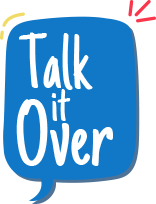How to talk with middle school students.
1. Take the lead.
Your child may not be as willing to start conversations with you about serious topics as before. If that’s the case, take the lead and engage your child in discussions at every opportunity by using real-life events in the news or in your own lives.
For example, your child tells you that a friend named Kevin rode in a vehicle driven by an older brother, who was smoking marijuana while driving.
- Explain to your child the importance of not riding in a car with someone who is using alcohol or drugs and explain what to do in that situation.
- You might say, “What Kevin’s brother did was illegal, and he could go to jail if caught. But more important, he could have had a serious accident. I hope you know you can call me if that ever happens to you, and I will come and get you. You’ll be driving in a few years, and I’m glad you are smart enough to know better than to drink or do drugs and drive.”
2. Encourage healthy growth.
To keep your child interested and engaged, talk about their interests and dreams. Then look for ways to nurture those interests in positive ways. Activities like art, music, sports, academic clubs, youth groups, and community service help keep children focuses, develop team-building skills, and discover new talents.
It’s Not Too Late
Of course, if you haven’t had those conversations yet, it’s not too late to start. In fact, this is the time when you should spend even more time talking and listening, as your child is likely seeing more substance use on television, in movies, online, at school, or in social situations. Children at this age can engage in more in-depth conversations about why people use drugs, the potential dangers (such as addiction or fatal overdose), and the consequences for the user and their family.
3. Work to improve self-image.
During middle schools, preteens begin going through physical changes and they start to care more about their self-image. Girls, especially, tend to pay more attention to hair and fashion.
As you notice this happening, start conversations with your child about how they look. Point out the obvious downsides to smoking, such as bad breath and stinky hair. You might even expand that into talking about the long-term risks, such as lung cancer and emphysema.
For children who are interested in sports, encourage them to stay healthy and avoid anabolic steroids as a “quick fix” for improving their performance.
4. Focus on friends and their parents.
Friends become extremely important during this transition. Kids want to fit in or feel normal around older teens who may introduce them to alcohol, tobacco, or drugs. So, in addition to talking to your child, get to know their friends.
For example, if you’re giving a group of kids a ride to the mall, ask the friends about their interests, their family, or what music or television shows they like. Also, get to know the parents of your child’s friends and share with them your desire to raise a drug-free child.
5. Practice makes perfect.
Part of your conversation with your child should include how to respond if someone offers them drugs or alcohol. Let your child practice his answers. “No, thanks. I’m not into that.” or “Nah, I play on the basketball team and don’t want to risk it.”
Promise your child that you will come get them any time – without scolding – if they need to leave a place where alcohol or drugs are being used. If you can’t be available, find a responsible adult who will go in your place.
6. Ask and listen.
Remember, your role as a parent isn’t just to talk but also to listen. Since your child may not ask as many questions at this age, it’s up to you to ask open-ended questions that require more than a simple “yes” or “no” answer.
Conversations starters can come from things your child is interested in such as music, movies, or TV shows. For example, if you hear song lyrics that mention drugs, ask your child, “What do you think about that? How does that make you feel?”


